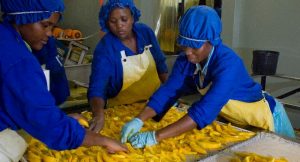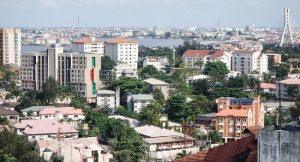2016 was “The Year of the Valley” for Africa.
After nearly a decade of galloping economic growth, the continent experienced a very sharp decline last year.
The hardest hit were the major commodity exporters, especially Nigeria, Angola and South Africa. Nigeria, Africa’s largest economy, went through a recession and its currency took a severe beating, losing more than 60 percent of its value in less than 12 months.
In South Africa, pull-backs in mining operations and volatile commodity prices (especially for gold, platinum, and coal) led to increased unemployment and slow economic growth.
Given the continent’s enormous economic challenges, it’s tempting to think:
“Are there still any viable business opportunities in Africa?”
“Is Africa still rising?”
You see, for decades, the biggest business opportunities in Africa were created through “traditional” sources, especially from the trade and export of raw and non-value-added commodities such as crude oil, timber, gold, coal, cocoa, tea, coffee, leather and several others.
Today, the wealth that is breeding a new generation of millionaires in Africa is being created through new and unconventional business opportunities.
These business opportunities are simmering beneath Africa’s endless stream of unsolved problems, underserved needs and everyday frustrations. New wealth on the continent is emerging from solving problems and creating value, and not from “old school” resource extraction.
In this article, I’ll share with you the top business opportunities on the continent that are very likely to make more millionaires in 2017.
Let’s meet them…
1) FinTech

FinTech is one of the newest and fastest emerging industries in Africa.
As the name implies, FinTech involves the use of technology to support and enable banking and financial services, making it easier, faster and cheaper to meet Africa’s underserved demand for financial services.
In many countries on the continent, access to financial services is very poor. In most cases, just about one in five adults has a bank account, and most transactions are still done in cash.
But since the wild success of M-Pesa, the revolutionary mobile money solution that has transformed financial services in East Africa, several innovative fintech products and services have erupted across the continent.
Just a few months ago, Paystack, a Nigeria-based fintech business raised $1.3 million from local and international investors. Paystack provides an online payments platform that allows local merchants to accept payments from around the world, via credit card, debit card, and direct bank transfer on web and mobile.
Another fintech solution, TopCheck, helps users to compare prices of financial products such as various types of insurance and bank loans. It has attracted over €1 million in investments and was recently acquired by South Africa’s Silvertree Internet Holdings.
SnapScan, the South Africa-based fintech service, allows consumers to make payments with their mobile phones by simply taking a photo of a QR code and punching in the amount they want to pay.
These are only but a few examples. There are hundreds of entrepreneurs on the continent behind fast-growing fintech companies such as Paga, Zoona, Interswitch, Wealth Migrate, Riovic, BitPesa and several others.
Fintech is hot in Africa right now because financial services is a severely underserved market, and a multi-billion dollar opportunity for the continent.
In 2017, the business opportunities in Africa’s fast emerging fintech scene will be interesting to watch as more investors and entrepreneurs take their positions.
2) Film & Movies

Over the last three years, three different blockbuster movies from Nollywood, Africa’s leading film industry, have broken local box office records back to back.
Despite major economic difficulties and a tough recession, “The Wedding Party”, a romantic comedy drama, has become the highest grossing African movie of all time, raking in over 400 million Nigerian Naira (just over $1 million) in less than 60 days after release.
One million dollars in box office pickings may be pocket change by Hollywood standards, but it’s the scale and growth of business opportunities in Africa’s film industry that’s truly breathtaking.
With a population of over 1 billion people, of which about 60 percent are young people below the age of 25, Africa presents a very fertile ground for its local film industry.
The four biggest business opportunities in this industry are in film financing, production, distribution and exhibition.
With less than one cinema per million people, Africa is the most underserved cinema market in the world. That’s why entrepreneurs like Kene Mkparu, who worked for many years with Odeon cinemas in the UK, have returned to the continent to explore lucrative opportunities in the African cinema market.
Since launching his business, Filmhouse has opened Nigeria’s first IMAX movie theater and about10 cinemas across the country in just a few years.
In the film distribution space, homegrown companies such as Iroko are consolidating their positions on the African market. With nearly $40 million in funding, and a strategic partnership with Canal +, Iroko is widely regarded as “The Netflix of Africa”, serving films in over 35 countries on the continent.
I’m really excited by the prospects of Africa’s film and movie market, and there’s no doubt in my mind that 2017 will be another year of blockbusters from the continent’s creative and entrepreneurial minds.
3) Sports Betting

Africa’s young and fanatical sports fan base makes it a very promising market for the global sports betting industry.
I have noticed how a growing number of betting businesses in the US and Europe are expanding into Africa as they position themselves to tap into an explosive growth opportunity for sports betting on the continent.
Lax laws on betting, a widespread use of mobile phones and increasing access to the internet have reduced the barriers to enter a 350-million strong African market, where nearly 50 percent of male adults in Nigeria, South Africa and several other countries are involved in active sports betting.
In July 2016, SportPesa, the biggest sports betting business in East Africa, became the first organisation in Kenya to sponsor an English Premier League football club after it signed a three-year deal with Hull City FC.
Why would a sports betting company in Kenya spend over a million British Pounds on a sponsorship deal in the most-watched football league in Africa? Your guess is as good as mine: “expected high returns on investment.”
Across the continent, in Ghana, Nigeria, South Africa and several other countries, hundreds of sports betting businesses are jostling for a greater share of this lucrative market as they spend handsomely on marketing, promotion and customer acquisition.
It would be interesting to watch how this fast emerging industry evolves in 2017.
4) Digital healthcare

Only a handful of countries in Sub-Saharan Africa can provide basic healthcare to all their citizens.
With less than one doctor per 20,000 persons in countries like Ethiopia and Tanzania, the healthcare industry in Africa is in a perilous state.
But entrepreneurs across Africa are taking on these challenges by creating innovative digital healthcare solutions.
These innovations, which include telemedicine, e-prescriptions and m-Health applications, are helping to free up congested health facilities from dealing with non-life-threatening conditions so they can provide better care to patients who require more critical care.
In Uganda, Brian Turyabagye – a young entrepreneur – and his team have developed a biomedical kit for early diagnosis and continuous monitoring of pneumonia, a disease that kills half a million children in Sub-Saharan Africa every year, according to UNICEF.
This kit, named “Mamaope” eliminates most human error, and diagnoses pneumonia at a rate three to four times faster than a doctor.
In Nigeria, Redbank is a new service that helps hospitals and patients quickly and easily search and find safe blood supplies in real time via SMS. This could potentially save thousands of lives especially in emergency situations and for patients in need of critical blood transfusions.
Across Africa, there is a growing trend of pharma firms looking to discover, support and partner with digital health startups. Last year, Merck – the global pharma giant – expanded its digital health accelerator program for the first time outside Germany to Nairobi, in East Africa.
I anticipate 2017 will be another interesting year for digital healthcare in Africa.
5) Renewable Energy

With a growing global bias for climate-friendly energy solutions, Africa has become an international test bed for innovative renewable energy solutions.
According to a recent World Bank study, only one in three people in Sub-Saharan Africa has access to electricity. And up to 80 percent of households on the continent use firewood and charcoal as a primary energy source for cooking, endangering the continent’s fast-depleting forest resources.
In Ghana, one company is harnessing the force of crashing ocean waves from the Accra coastline to generate electricity. Yam Pro Energy has secured a power purchase agreement (PPA) that allows it to sell the electricity it generates, and the project could provide up to 10,000 households with electricity.
Across the continent, the solar energy revolution is in full swing. In East Africa, businesses such as M-Kopa Solar, Off Grid Electric, StemaCo and several others are lighting up Africa by using the power of the sun to provide low-cost electricity to unconnected households.
In West Africa, where sewage collected from households is often dumped into rivers and the ocean, this business in Accra, Ghana, converts smelly human waste into an odourless and energy-efficient fuel which looks exactly like charcoal and can be used for cooking.
This year, the $5 billion Grand Ethiopian Renaissance Dam will open in East Africa. This 6,000-megawatt power plant will be the largest dam and hydropower plant in Africa. Though a government-owned asset, this dam will be a major milestone in Africa’s progress toward a renewable energy-dependent future.
Africa’s significantly underserved energy needs presents a lucrative market for renewable energy solutions and I expect more players will be drawn to this promising industry in 2017.
6) Urban Transportation

The effects of rural-urban migration and natural population growth have overwhelmed transport systems and infrastructure in major cities and towns across Africa.
According to the AfDB, Africa has experienced the highest urban growth in the developing world. During the last two decades, Africa’s urban population grew by 3.5 percent per year and this rate of growth is expected to hold into 2050, with some African cities accounting for up to 85 percent of the national population.
While government authorities and urban dwellers are frustrated by the congestion, inefficiency and disorganized nature of urban transport systems on the continent, a growing number of businesses are exploring the business opportunities behind this underserved market.
Uber, a highly successful multinational ride hailing business, is one of the big players harvesting the opportunities in Africa’s urban transport market.
Now present in 12 cities across the continent, including Johannesburg, Lagos, Kampala, Nairobi, Rabat and Cairo, Uber has created a powerful platform for entrepreneurs and investors to reap the lucrative rewards of serving urban transport needs in Africa.
Hundreds of entrepreneurs now earn recurring monthly revenues by putting cars on the Uber network, whose value proposition of convenience, affordability and comfort has created a loyal and fast-growing customer base of urban commuters.
Magic Bus is another business that presents an interesting solution to urban transport needs in Nairobi, Kenya. It uses an SMS-based system that allows urban commuters, especially in slum areas, to pre-book their bus tickets using basic mobile phones.
The startup, which attracted $1 million from the Hult Foundation, has the potential to increase bus availability, and reduce the frustrations caused by adhoc bus systems in urban areas.
In 2017, more entrepreneurs and investors will be advancing innovative solutions to the urban transport problems in Africa. It’ll surely be an interesting industry to watch.
7) Pay TV

There are over 100 million TV households in Sub-Saharan Africa.
However, at the moment, just about 15 million of these households are pay-TV subscribers, and this number is expected to reach 30 million by 2021.
According to a study by Dataxis, the five biggest pay-TV markets account for 65.4 percent of total African pay-TV subscriptions. These are: South Africa (35.8%), Nigeria (14.5%), Angola (6.5%), Tanzania (4.4%), and Kenya (4.2%).
Currently, the biggest players in these markets are South Africa’s MultiChoice, China’s StarTimes, East Africa’s AzamTV, Safaricom and Zuku TV. In Francophone Africa, Canal Plus Overseas remains the dominant operator.
Africa’s large population and its youthful demographic makes the continent a very attractive market for the pay-TV industry. With annual revenues estimated at over $4 billion, there is still a lot of room for new players in this market.
Just a few weeks ago, Econet Media, owned by Strive Masiyiwa – one of Africa’s most successful entrepreneurs – entered the pay-TV market with the launch of Kwesé TV. The service has gone live in Ghana, Rwanda and Zambia, and plans to roll out to more countries by April 2017.
Africa’s growing internet penetration, rising smartphone adoption, and digital migration will be the key growth drivers of the pay-TV market in Africa as niche offerings such as video-on-demand (VOD) and Internet Protocol TV (IPTV) evolve.
In 2017, more households on the continent will become pay TV subscribers, generating more revenue for new and existing players in Africa’s fast-emerging pay TV market.
8) Food Processing

It’s widely believed that Africa does not produce enough food to meet its own needs. The continent actually produces far less food per hectare than the world average.
However, while food production remains a big challenge for the continent, post-harvest losses and waste are the biggest threats to food security in Africa.
Due to inadequate processing options, a significant proportion of harvests from farms in Africa never make it to the final consumer.
Right now, Africa’s biggest food problem isn’t production; it’s processing, and then, marketing.
If Africa could process more of the food it produces, food waste will reduce, food supplies would be more stable and less seasonal, and food prices would be less prone to wild swings.
Take the case of tomato in Nigeria. Despite being a leading producer of tomato in Africa, Nigeria has spent millions of dollars on processed tomato paste imports from China.
The same situation applies to several other imported processed food products whose raw materials are abundantly produced in Africa: fruit juice concentrates (processed from raw fruits), industrial-grade starch (from cassava), edible oils (from soybean and cotton seed) and several others.
Young African entrepreneurs like Affiong Williams, founder of Reelfruit, are taking on the food processing challenge in Africa. Reelfruit processes a range of seasonal fruits including mango, pineapple and coconut into dry fruit snacks that can be consumed throughout the year.
As more entrepreneurs and investors pursue agribusiness opportunities in 2017, I’m really looking forward to more grand ideas and innovations that could transform the state of food security on the continent.
9) Real Estate

In all my previous special reports, for 2015 and 2016, real estate has always been featured.
This is hardly surprising given the current and future size of Africa’s population. According to the United Nations, more than half of global population growth between now and 2050 is expected to occur in Africa. Of the 2.4 billion people who are expected to join the world over the next 30 years, 1.3 billion of them will be Africans.
Where will all these people live, work, shop and play?
Currently, countries across the continent suffer a significant real estate deficit. In Nigeria, for example, the World Bank estimates the affordable housing deficit at over 17 million homes. In Lagos, one of Africa’s largest cities with a population of over 15 million people, there are less than 7 major shopping centres.
It’s the severity of the real estate deficit across Africa that makes it such an amazing multi-billion dollar business opportunity.
Across the major segments of the market – residential, office spaces, retail, industrial and hospitality – investors and developers are positioning themselves to benefit from underserved needs.
The Landmark Group is one example among several others that have been pursuing real estate opportunities in Africa, and maintains a multi-million dollar portfolio of properties on the continent.
The Group has developed and managed over 130,000 square meters of prime real estate across the continent, and is building a Landmark Village, which will be an iconic “Live, Work, Play” mixed-use development with breathtaking sea views in the exclusive area of Victoria Island in Lagos.
As more investors and developers take more stakes in Africa’s real estate market, I have no doubts that new firsts will be recorded in 2017.
10) African Fashion

Africa is in the heat of a fashion revolution.
The explosive combination of creative genius and entrepreneurial talent is increasing the visibility of African fashion on the world stage, as a new breed of designers are leveraging the continent’s rich cultures, history, and fabrics to make bold fashion statements.
Young African designers such as Maki Oh and Aisha Obuobi have featured fashion pieces worn by international celebrities, including Beyoncé and Michelle Obama.
The African Development Bank estimates Africa’s fashion industry could be worth $15.5billion over the next five years. While this is huge, it’s only a small share of the global fashion industry’s value of $1.3 trillion.
Despite its current challenges, Africa’s fashion industry has the potential to create millions of jobs and significantly boost economic growth on the continent. This is already happening in countries like Mauritius, Ethiopia and Lesotho where apparel exports are a major foreign exchange earner.
African entrepreneurs like 26-year old Kelechi Anyadiegwu are already reaping benefits from the fashion value chain.
She started her online African clothing store, Zuvaa, with just $500 two years ago. Her idea was to share African-inspired fashion designs with consumers around the world. Zuvaa is estimated to make nearly $2 million in sales in 2016.
As more African fashion designers, entrepreneurs and stylists unleash their creativity and imagination in 2017, the world is in for a big surprise.
11) Startup Funding

Mark Zukerberg’s surprise first visit to Sub-Saharan Africa last year was a strong external validation of Africa’s fast emerging startup landscape. During the trip, the Facebook CEO who is one of the world’s richest men, visited startup innovation hubs in Lagos and Nairobi.
In June 2016, Zuckerberg invested $24 million in Andela, a startup that trains African engineers and programmers, and outsources them to top tech companies in the USA and Europe.
According to the latest Disrupt Africa Funding Report on African tech startups, the continent attracted $129 million in 2016, with a 16.8 percent increase in the number of successfully funded startups. South Africa and Nigeria raised the highest amount of funding, followed by Kenya, Egypt, Ghana and Morocco.
Africa’s fast-emerging startup scene is a hotbed of innovation and disruptive possibilities. It’s no surprise there’s been a galloping growth in the number of innovation hubs, incubation and accelerator programs on the continent.
Africa is one of very few places in the world today that can deliver the massive growth and scale necessary to yield very high returns on investment capital.
As venture capitalists and angel funds continue their search for promising investment opportunities, the exciting potential of Africa’s burgeoning startup ecosystem will be hard to ignore in 2017.
2017 will continue the reign of new wealth in Africa
Given the scale of business opportunities on the continent, there’s no doubt that 2017 will create its fair share of winners and millionaires in Africa.
These winners will include individual entrepreneurs, private and institutional investors and the ecosystem of specialists and advisors who support them.
These visionaries and believers deserve the rewards. Afterall, while the rest of the world perceives Africa as a cesspool of intractable problems, these winners are discovering new and uncontested wealth opportunities by solving serious problems and creating value on the continent.
I do not expect the tough business climate or lack of government support in Africa will change much in 2017; in truth, these have never stopped the winners from winning.
2017 will continue the reign of new wealth in Africa.
Let’s go, Africa!
If you like the business opportunities in this article, you’ll love my book, “101 Ways To Make Money in Africa.” The book has been read by thousands of entrepreneurs and investors in 45+ countries, and it will open your eyes to several amazing business opportunities through the ideas and success stories it contains.
Author: John-Paul Iwuoha
Author, Business Strategist & Champion for Entrepreneurship in Africa



